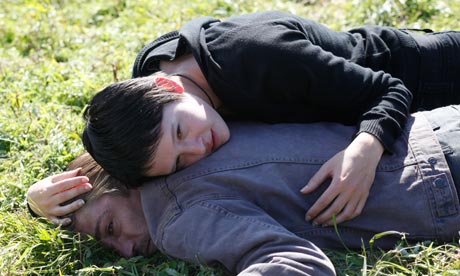
It could be the antihero who is supposed to be "outside Satan" in Bruno Dumont's latest film, or it could be the remote, islanded world he inhabits. He and they are quite close to Satan, at all events; it is perhaps truer to say he is outside both God and Satan. Devotees of Dumont's earlier films – particularly his 1999 film Humanity – will instantly recognise the style, the locale, the narrative, the bizarre quasi-realism, in which events take place in a world infinitesimally different from the one we inhabit. As ever, the visionary, radioactive glow is compelling.
We are back in the broad, wild coastal landscapes of northern France, of which Britain's nearest equivalent is the East Anglian fen, a world of largely unsmiling, often unspeaking characters represented by non-professional actors. It's a world in which grim brutality and glorious beauty can co-exist, a place where epiphanies are available to the humblest, a world depicted in a manner comparable to Bresson or Dreyer, but with a shocking and explicit violence alien to both.
David Dewaele is an actor who had a small part in Dumont's earlier film Hadewijch, and he returns here in a much larger but not dissimilar role: it is tempting to wonder if he is in fact playing the same role, further down the road. He is unnamed, a drifter, or perhaps a traveller (there is some talk about his "camp") who sleeps rough huddled by a broken wall on the beach, pitching campfires. He has formed an intense friendship with a lonely, goth‑ish young woman (Alexandra Lemâtre), who has confided to him that she is being abused by her stepfather.
Violent retribution is at hand. Lemâtre and Dewaele's characters are as close as lovers, but to her dismay he has no physical desire for her; instead he seems to be an ascetic, mystic figure, offering his own self-created prayer ritual to the landscape, which Dumont and his cinematographer Yves Cape invest with a disturbing, extraterrestrial beauty. Dewaele's loner is a kind of anchorite, and some locals even believe he has miraculous healing powers. Bizarre and shocking acts of violence follow, rendered the more enigmatic and bizarre by Dewaele's unreadability – a face weatherbeaten into blankness, as expressionless as a tattoo – and the way Dumont allows him to exist outside any normal cause-and-effect world of retribution.
As with so many Dumont movies, the police put in an appearance, but they are strangely ineffective in their investigations. The prime suspect being (finally) apprehended, put in custody and then mysteriously allowed to walk free is a recurrent trope in Dumont films, and it duly recurs here.
In another type of film, a film in which the police can see what is under their noses, the man and woman would take off together, they would go on the run. Here, the man and woman do not go on the run but roam endlessly around their own territory, unpoliced. They wander freely across this terrain, but almost always away from the main roads; in companionable silence, they are always pulling back broken fences and lifting up ropes of barbed wire for each other. They are natural, unself‑conscious trespassers. Dumont's biggest coup is the scene in which his leads come across the landscape that has been set on fire: almost the entire horizon is a belt of flame with a dark pall of smoke above: a digital creation, but stunningly convincing. How has it happened? Is Dewaele's character an arsonist, as well as everything else? Or has he supernaturally ignited it? Are they hallucinating? For the audience, too, the effect is like lucid dreaming. What unspools on screen looks like recognisable reality – or recognisable realism – but isn't.
I thought of two things watching Hors Satan: one was the line from Lars Von Trier's Antichrist: "Nature is Satan's church." The other was Alan Weisman's eco-futurist classic The World Without Us, which asks the reader to imagine how the natural and manmade world would change over the succeeding millennia if humanity were somehow magicked away from it. The northern France of Hors Satan looks eerily and untameably beautiful, like Weisman's humanless world, but with a group of humans transplanted back into it, aeons later, as if in some sci-fi experiment. Bruno Dumont's film-making is just so fluent, unnerving, gripping; he is entirely unique.

